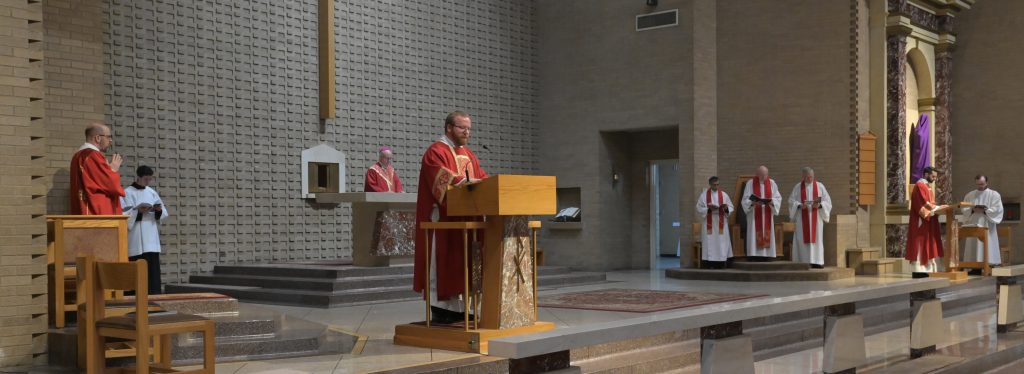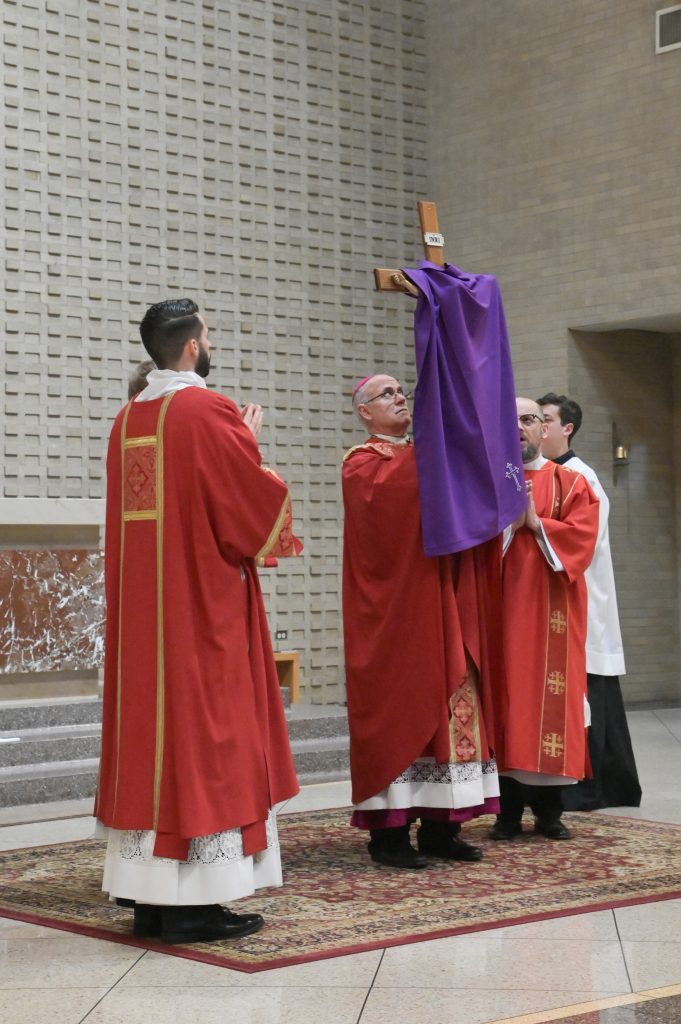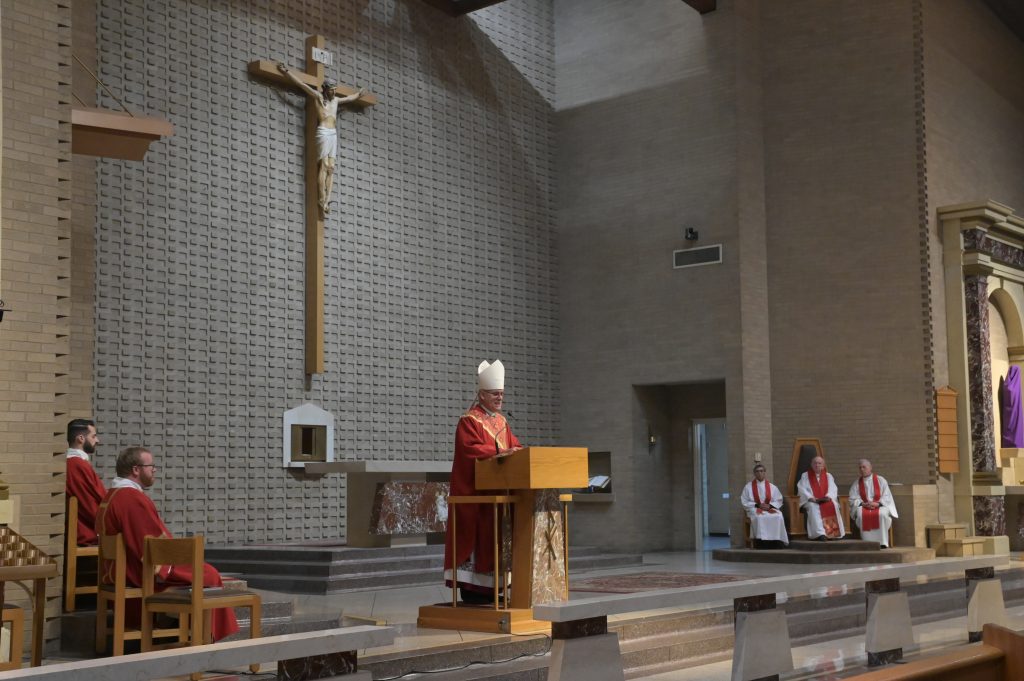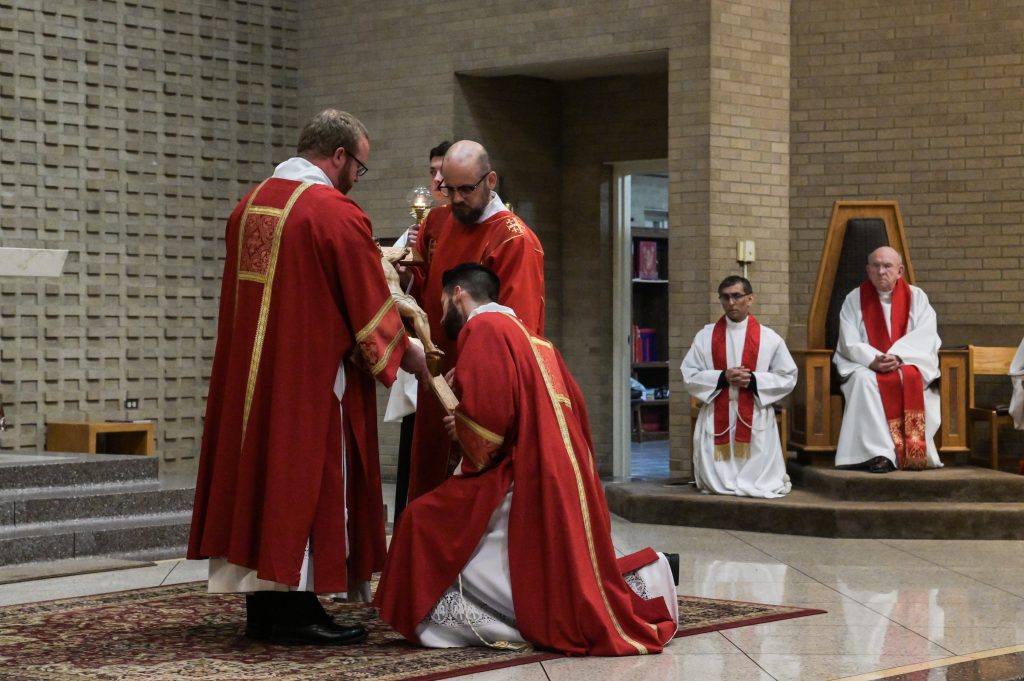April 12, 2023 // Bishop
Why Do We Call It Good Friday?
“I sometimes get asked why we call this day of Christ’s death Good Friday since it is the day of our Lord’s horrible crucifixion. I usually answer with the words that I learned and memorized when I was a little boy, the answer that was given in Baltimore Catechism, and that is Good Friday is good because, on this day, Christ showed His great love for man and purchased for him every blessing. That’s why we call today Good Friday,” said Bishop Rhoades to the congregation during his homily on Friday, April 7, as he celebrated the Passion of the Lord at St. Matthew Cathedral in South Bend.
Bishop Rhoades shared with the hundreds gathered in prayer that Good Friday has different names in different parts of the world. In many places, it is called Holy Friday, or as members of the Latino culture call it, Viernes Santo. Eastern Catholics and Orthodox Christians refer to the day as Great and Holy Friday or simply Great Friday.
“Today is truly good. It is great and holy because it is the day of our redemption. It is a day of hope, but it is also a day of sorrow,” noted Bishop Rhoades.

Derby Photography
The reading of the Passion takes place on Good Friday with Bishop Rhoades at the service of the Passion of the Lord at St. Matthew Cathedral in South Bend on April 7.
German-speaking countries call Good Friday Karfreitag which translates into suffering or sorrowful Friday and St. Ambrose in the 4th century called the occasion the day of bitterness.
“Good Friday is both a day of sorrow and a day of hope. First, it is a day of great sorrow. We express our sorrow for our sins by fasting today and by abstaining from meat,” said Bishop Rhoades. “It’s also the only day of the year in both the East and the West when Mass is not celebrated. Back in the 3rd century, the ancient Christian writer Tertullian gave the reason. He said it is not fitting that we should celebrate a feast on the day when the bridegroom is taken from us.”
More photos from Good Friday in South Bend.
On Good Friday, we contemplate the passion and death of our Lord Jesus Christ.
“We contemplate the man of sorrows, the suffering servant, prophesied by Isaiah in the first reading, ‘whose face was marred beyond human semblance … spurned and avoided by people, a man of suffering … one of those from whom people hid their face,’” said Bishop Rhoades. “We heard, as Isaiah foretold, that ‘though the servant was harshly treated, he submitted and opened not his mouth; like a lamb led to the slaughter or a sheep before the shearers, he was silent and opened not his mouth. Oppressed and condemned, he was taken away.’”
Bishop Rhoades said, “Jesus often remained silent during the passion and trial. He was condemned to death by Pontius Pilate, and was taken away to the place of the Skull, Golgotha, and nailed to the cross.”
He continued, “After Jesus died, a soldier thrust a lance into Jesus’ side. St. John tells us that this fulfilled another prophecy from Scripture. In the passage from Zechariah, which says: ‘They will look upon Him whom they have pierced.’ On Good Friday, that’s what we do. We gaze in contemplation upon the face of Jesus nailed to the cross, on the Suffering Servant of God, on Him whose heart was pierced with a sword.”
Bishop Rhoades explained that our sorrow comes from knowing that Isaiah’s words were true, that Jesus was pierced for our offenses, crushed for our sins, and that He wore our inequities when He carried the cross. He also shared that Catechism says, “The Church has never forgotten that ‘sinners were the authors and ministers of all the sufferings that the divine Redeemer endured.”
Bishop Rhoades continued his homily, saying, “St. Francis of Assisi once said to his brother friars words that can be addressed to us: ‘Demons did not crucify Jesus. It is you who have crucified Him and crucify Him still, when you delight in your vices and sins.’ So, today, Good Friday, should be a day of repentance and sorrow for our sins.”
The Reproaches, a litany sung as people honor or meditate about the cross, were part of the liturgy.
“This part of our Good Friday liturgy may be uncomfortable. The Reproaches are difficult to hear, but they help us to remember that Jesus died for our sins. Yet, we should listen to the Son of God asking us these questions ‘not with the accusatory voice of a judge, but with the quiet cry of a lover.’ Otherwise, we could fall into the sin of despair. When we look at Jesus on the cross, we should be filled with sorrow for our sins, but not fall into despair because we are looking at the face of God’s mercy, the face of the One who loved us to the end,” said Bishop Rhoades. “We are looking at the pierced heart of Jesus from which flowed cleansing water and the blood of the new covenant which was poured out for the forgiveness of sins. We’re looking at the Sacred Heart of Jesus from which the Church was born and the sacraments of Baptism and the Eucharist came forth. We are gazing at the Heart which reveals to us the love of God for every human being, and from which we receive His spirit. So, we do not despair like Judas. We repent like Peter.”
According to Bishop Rhoades, “We must beware of the sin of presumption, which is why we need to hear the Reproaches and recognize that we are sinners who need to repent and turn to our merciful Savior with true sorrow for our sins.”
Bishop Rhoades then spoke about the second reading from the letter to the Hebrews that says, “We have a great high priest who has passed through the heavens, Jesus, the son of God. So, let us confidently approach the throne of grace to receive mercy and to find grace for timely help.” He told those in attendance, “We believe, as the letter says, that when Jesus ‘was made perfect (by his obedience to death), He became the source of salvation for all who obeyed him.’”
Bishop Rhoades continued, “So today is not only a day of sorrow, it is a day of hope. It really is Good Friday. It truly is Great Friday because it is the day of our redemption.”
During the liturgy, the cross was venerated, not as an instrument of torture and death or a sign of defeat, but as a luminous sign of God’s love.
“We will venerate the cross of Jesus because by his Holy Cross, He has redeemed the world. We will venerate the cross as the tree of life because our crucified Lord overcame evil and death with the power of merciful love,” said Bishop Rhoades. “His resurrection, the celebration of which will be the climax of this Pascal Triduum, gives us this certainty. Our crucified Lord became our risen Lord.”
At the end of the homily, the congregation was invited to entrust themselves to the Blessed Virgin Mary who accompanied her son on His journey.
“From the cross, Jesus gave her to us as our mother and entrusted us to her loving care. She accompanies us in all of our sorrows. Our Blessed Mother is always with us, especially when we’re hurting and going through trials and sufferings. She gives us comfort with her compassion and love,” said Bishop Rhoades. “She is Our Lady of Sorrows and our Mother of Consolation.”
The best news. Delivered to your inbox.
Subscribe to our mailing list today.









